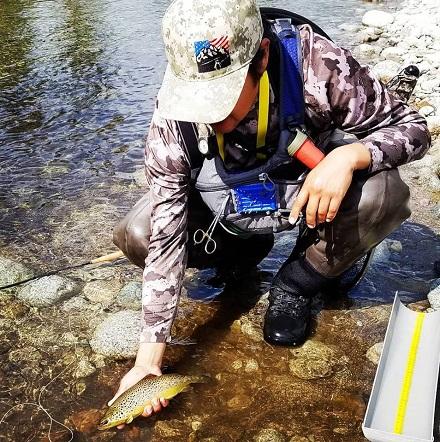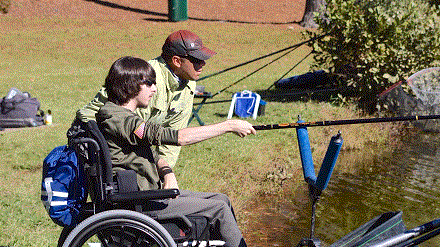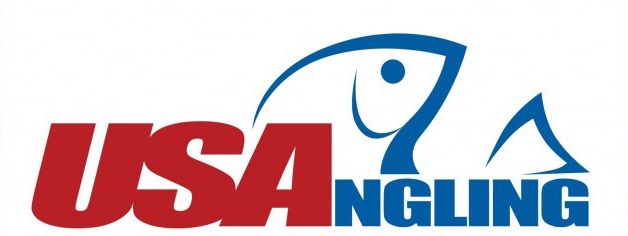
The United States Angling Confederation (U.S. Angling) is an emerging sports provider of national and international fishing events. Upcoming major events include hosting the 2019 Pan-American Bass Kayak Championship with Cookeville-Putnam County Visitor’s Bureau on Center Hill Lake this month and the 2020 Bass World Championship with Capital City Lake Murray RTB. U.S. Angling’s goals can be summed up by our three “Cs”: Community, Conservation and Competition. U.S. Angling is dedicated to engaging existing anglers and recruiting new ones (youth, women, seniors [over 50] and disabled anglers) in communities nationwide.
U.S. Angling also supports local conservation efforts to enhance and protect angling resources for angling communities. The organization is dedicated to identifying, training and supporting the U.S. national fishing teams that compete worldwide. Host communities are a critical need for U.S. Angling to expand and meet its initiatives, and destinations are encouraged to apply.

Tony Forte: Yes, U.S.Angling has launched its membership program. It is available at www.usangling.org/membership. Membership is a way to support our USA fishing teams and our newsletter will keep you posted on U.S.Angling clinics, national team events and give anglers access to world-class fishing tips.
SDM: What types of fishing are represented?
Forte: We have national teams competing from the following demographics: Adult (Men & Women), Women’s, Youth, Seniors (over 50), and Disabled. U.S. Angling currently has teams for Bass fishing, Ice fishing, Fly fishing (Youth, Adult, Masters), Kayak Bass Fishing, Predator fishing, Bank fishing (Adult, Women), Carp fishing and Big Game Saltwater fishing. Our sports in development are Youth & Disabled Bank Fishing, Women’s Fly fishing and Saltwater surf fishing (Adult, Women, Youth).
SDM: Does fishing appear as part of wider multi-sport, multi-disciplinary events, or is it held only as standalone competitions?
Forte: We have conducted events in both manners. Including fishing as part of Outdoor games, or Festivals is an excellent complement to large events. A huge strength of U.S. Angling is the ability to utilize whatever body of water is available because of the diversity or our fishing styles. We have events in beautiful mountain streams and in areas with compromised water quality. No matter where events are held, we are happy to catch fish and let them go.
 SDM: Over the years, tournaments have changed and have created their own industry. Do you see events continuing to evolve?
SDM: Over the years, tournaments have changed and have created their own industry. Do you see events continuing to evolve?
Forte: Technology is also enabling us to hold large scale events in multiple locations. Catch, measure, photo and release holds immense potential and can highlight communities that have multiple watersheds available. It could be a nationwide or even global competition. You could catch a fish, take a picture using your smart phone and submit it to the contest. It would really make destinations competitive – and not just the ones that have boat ramps. It would mean we could have competitions for different types of fish and we would wind up with a nice pool of pictures to use for angling advocacy. We have the technology now; if we don’t use it, we’re really shooting ourselves in the foot.
SDM: Do you encourage destinations and event owners to host ancillary events, such as expos and clinics along with their tournaments?
Forte: Yes – we believe very strongly in clinics and fishing derbies. They can be arranged and conducted very cheaply using volunteers – and it gets kids and spectators interested in the sport. All the pro bass tours are backing this as well.
 SDM: We’ve heard that bass fishing at the high school level is taking off, as well as at the collegiate level. What do you see as a growth sector?
SDM: We’ve heard that bass fishing at the high school level is taking off, as well as at the collegiate level. What do you see as a growth sector?
Forte: One of the sports we feel has a lot of potential is kayak fishing. If as a school, I don’t have access to a bass boat – and by the way, it can be hard to get bass boats donated so kids can fish – I can still get a kayak, a canoe or a paddleboard and get out on a body of water and compete. An athletic department can often afford something like this and sometimes, kids can buy it for themselves. They have the advantage of being human-powered, so they don’t need gas or a lot of maintenance. And by using a kayak, kids can fish pretty much anywhere, and they can get places other boats can’t go, including out on smaller bodies of water. We’re really excited about this part of the sport.
SDM: A few minutes ago, you mentioned women’s fishing and a disabled category as well. Are these areas where you’re trying to grow numbers?
Forte: For sure, women are one of the groups we want to grow. Fishing is a sport that men and women can compete on a level playing field and interest in fishing is on the rise for women anglers. We also have a team of disabled anglers and we’re training them to compete. We’ve seen it happen; we take some folks who have disabilities out and they catch some fish and suddenly they’re having a ball. The opportunity to grow is thereand volunteers enjoy being a part of the events.
 SDM: It seems like bass fishing gets a lot of media love but obviously, there are multiple opportunities for fishing.
SDM: It seems like bass fishing gets a lot of media love but obviously, there are multiple opportunities for fishing.
Forte: Yes – we love that bass fishing is big, but it is our strategy to maximize our media attention on all our national teams and hope that it will spill over onto the other disciplines. It is a simple equation to me – if you only look only at one type of fishing, you’ve eliminated the fishing in maybe 80 percent of the country. But fishing has many disciplines and they can all be fun. We’d really like for people to know that. Whether you catch a catfish or a striper, whether you’re on a boat or a dock or out on the ocean, you’re going to enjoy yourself.
SDM: What disciplines do you think really need more participants and more tournaments?
Forte: I would say salt water is something we’d like to see grow. Surf fishing or beach fishing is a huge opportunity for America's anglers. We haven’t found a champion in these disciplines that will take the ball and run with it. We have been talking with folks in places like New England, New Jersey, Delaware, the Carolinas, Texas – those are hotbeds for surf fishing. Ideally, we’d like to work with an outdoor channel that would be able to follow all of our teams as they compete and to have episodes dedicated to different disciplines of fishing. That way, if you don’t live near a bass lake but you still want to fish, you have a way to learn about the opportunities that are available to you.
 SDM: Is it bass fishing, or fishing in general, that is being contested on the World and Pan-Am levels?
SDM: Is it bass fishing, or fishing in general, that is being contested on the World and Pan-Am levels?
Forte: There are currently World and Pan-American events for four fishing classifications: Freshwater, Saltwater, Fly and Distance Surf Casting. U.S. Angling is the sole representative for the United States to the World Fishing Organization, Confederation Internationale de Peche Sportive (CIPS), the international governing body of fishing. CIPS has a staggering 77 member nations representing over 50 million competitive anglers.
U.S. Angling is also a charter member of the Pan-American Sportfishing Federation. The key difference between U.S. Angling and other tournament organizations is that we are 501 (C) (3) that runs events for national and international medals. These are not prize money events. They are conducted in the spirit of the Olympic ideal. The celebration of sport and fellowship of anglers, spectators and associated communities is enriching and refreshing to those involved.
SDM: Does your organization select and/or train national teams who represent the USA at events? If so, to which events does it send competitors?
Forte: The model for most USA fishing teams follows the following format: U.S. Angling membership, Clinics, Local Competitions, Regional Competitions, National Competitions, Team Qualifer Competitions, Pan-American Championships, World Championships (U.S. Angling is currently updating its event schedule, website, and membership structure to accommodate fast growing interest)
 The most successful USA team is our Youth Fly Fishing Team. They have produced incredible results on the world stage (Gold – 2011, 2013, 2014 Medalists 2012, 2015, 2016, 2017). They have also completed several significant conservation projects and hold several world class fly fishing clinics annually.
The most successful USA team is our Youth Fly Fishing Team. They have produced incredible results on the world stage (Gold – 2011, 2013, 2014 Medalists 2012, 2015, 2016, 2017). They have also completed several significant conservation projects and hold several world class fly fishing clinics annually.
Our bass fishing teams are made up of our top professionals. We use results from the top three bass fishing tours: FLW, B.A.S.S. and Bass Pro Tour. Our 2018 Pan-American team hosted the event on Lake Okeechobee and won the Gold medal. This team featured Shirley Crain and Michelle Jalaba among others. Our USA team led by Captain Scott Martin and Scott Canterbury also won the World Championship Gold Medal in Mexico with a dominant performance.
SDM: We’re betting there are people out there who weren’t aware the U.S. fielded competitive fishing teams. What are the selection criteria?
Forte: Obviously, the first requirement is to have tremendous skill. How well a person can work within a team of four to five anglers, and sometimes more, is the second part. If you are a virtuoso but you can’t communicate or help the other guys, your value as a team member is decreased. The total catch of the team ends up being the measure. It’s like any other sport – each person needs to be able to listen and learn from the managers and the other coaches and folks who are involved. The other thing that is not negotiable is you have to be a very effective ambassador for your nation. If you are going to show up and be a grump, you’re gone. We expect our team members to embrace the responsibility of representing our nation and almost without exception, they respond.
SDM: The uptick in attention to fishing as a result of all the media attention has been really encouraging.
Forte: It’s exciting for us just to see that people are interested in fishing for just more than money. When you start really looking at fishing, you find out is it is a sport in almost every country. It can be bass fishing in the U.S. or tilapia fishing in Africa and the result is the same: people are trying to challenge themselves and build a skillset for fishing.
 SDM: Do you see bass fishing (or maybe even fishing in general) making application to the IOC at any time?
SDM: Do you see bass fishing (or maybe even fishing in general) making application to the IOC at any time?
Forte: Yes, CIPS has formally submitted the application to become a Recognized IOC Sport. The feedback is that fishing has become “a sport of interest.” The IOC is looking for data on global media awareness, increased gender diversification and overall nation count increase. U.S. Angling is working hard with CIPS to achieve these goals.
U.S. Angling advocates for the competition element but we’re also really focused on enjoying fishing and fellowship. When I fished for the U.S.A. competitively and we went to Italy, I met people from 42 nations there and most did not speak the same language, but everyone could pull out their phone and start scrolling throughfish pictures and instantly, everyone had this connection. Not everyone might have been able to say, “Look what I caught” in every language but the excitement and body language was there, and it was just infectious. Fishing is its own language. It’s a common thread. That’s the beauty of it. Fishing is not "a sport" but "the sport" for millions of people worldwide.

 usangling.com
usangling.com